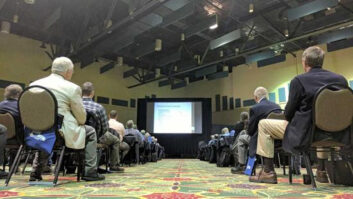The FCC is openly giving radio broadcasters a chance to reboot their online political file efforts and address timeliness issues for candidate and issue advertising rate uploads. The commission for now appears to be ending investigations into those online public files and holding off fining broadcasters that need to catch up.
The most recent developments stem from an investigation the commission launched in early 2019 following a complaint against Entercom and its Buffalo, N.Y., cluster from a political candidate and whether she was charged the lowest unit rate possible during the 2018 election cycle.
[Read: Yet More Settlements in Political File “Derelictions”]
During that investigation several other major radio groups self-reported political file issues to the FCC with hopes of reaching an agreement on compliance. The National Association of Broadcasters helped broker an agreement earlier this summer that resulted in signed consent decrees with a half-dozen major radio groups that close FCC investigations and ensures compliance, but do not levy fines, said Robert Baker, an FCC attorney who appeared on a recent webcast hosted by the New York State Broadcasters Association.
“These consent decrees will require the broadcasters to submit compliance plans for the remainder of this year and through the end of 2021,” Baker said. Along with Entercom the group of six includes Alpha Media, Beasley Media, Cumulus Media, iHeartMedia and Salem Media Group. The broadcasters admit they were tardy in updating their online political files with relevant materials, according to the FCC. In all, the six groups own nearly 1,900 radio stations.
“It is crucial that stations maintain political files that are complete and up to date because the information in them directly affects, among other things, the statutory rights of opposing candidates to request equal opportunities,” according the consent decrees.
The FCC has recently been more focused in online political file compliance, observers say, most likely because of the current election cycle and the resulting political advertising being placed.
[Read: Big Radio Companies Settle With FCC on Online Political Files]
The FCC’s consent decree with Entercom is blunt in its wording: “Entercom has now formally agreed to enter into the attached consent decree, pursuant to which Entercom admits that it repeatedly violated its political file obligations by not uploading required records in a timely manner. Entercom further agrees to implement a comprehensive compliance plan to ensure future compliance with its political file obligations and to submit periodic compliance reports to the bureau.”
“The goal of our efforts is to gain compliance. Simple as that,” Baker said during the webinar.
Similarly, the FCC has resolved online political files compliance issues with another 107 smaller radio licensees, again through consent decrees, that are meant to ensure future compliance. None of the smaller radio broadcasters will face monetary fines.
For instance, the FCC recently released a consent decree with radio licensee Carter Broadcasting, which owns WSBZ(FM) in Miramar, Fla. The FCC found the licensee failed to comply with political file requirements and suspended processing its license renewal application as a result. The consent decree stated: “Carter Broadcasting, Inc. agrees, among other things, to implement a comprehensive compliance plan to ensure future compliance with its political file obligations and to submit periodic compliance reports to the Media Bureau.”
Baker, the FCC attorney, encourages radio licensees that have been derelict in maintaining their online political file to reach out to the FCC for assistance if it is needed.
The commission says it first adopted rules requiring broadcast stations to maintain public files documenting requests for political advertising time more than 80 years ago. The FCC transitioned the public file from in-station to online for all radio licensees in 2018.
See more stories on Political Files here.










